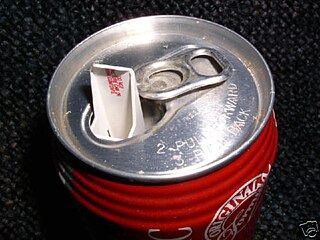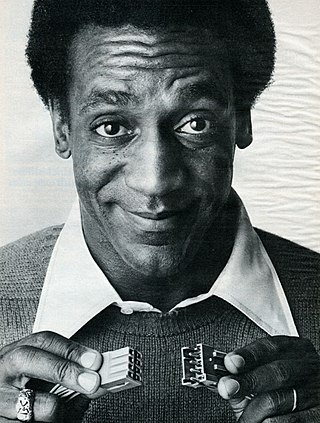
Coca-Cola, or Coke, is a carbonated soft drink with a cola flavor manufactured by the Coca-Cola Company. In 2013, Coke products were sold in over 200 countries worldwide, with consumers drinking more than 1.8 billion company beverage servings each day. Coca-Cola ranked No. 87 in the 2018 Fortune 500 list of the largest United States corporations by total revenue. Based on Interbrand's "best global brand" study of 2020, Coca-Cola was the world's sixth most valuable brand.

Pepsi is a carbonated soft drink with a cola flavor, manufactured by PepsiCo. As of 2023, Pepsi is the second most valuable soft drink brand worldwide behind Coca-Cola; the two share a long-standing rivalry in what has been called the "cola wars".

Mountain Dew, stylized as Mtn Dew in some countries, is a carbonated soft drink brand, produced and owned by PepsiCo. The original formula was invented in 1940 by Tennessee beverage bottlers Barney and Ally Hartman. A revised formula was created by Bill Bridgforth in 1958. The rights to this formula were obtained by the Tip Corporation of Marion, Virginia. William H. "Bill" Jones of the Tip Corporation further refined the formula, launching that version of Mountain Dew in 1961. In August 1964, the Mountain Dew brand and production rights were acquired from Tip by the Pepsi-Cola company, and the distribution expanded across the United States and Canada.
A hidden message is information that is not immediately noticeable, and that must be discovered or uncovered and interpreted before it can be known. Hidden messages include backwards audio messages, hidden visual messages and symbolic or cryptic codes such as a crossword or cipher. Although there are many legitimate examples of hidden messages created with techniques such as backmasking and steganography, many so-called hidden messages are merely fanciful imaginings or apophany.

Coca-Cola Vanilla is a vanilla-flavored version of Coca-Cola, introduced in 2002 but subsequently discontinued in North America and the United Kingdom in 2005, only remaining available as a fountain drink. It was relaunched in the US in 2007; in Denmark in 2012, the UK in 2013, and Canada in 2016. Vanilla Coke has been available in Australia since its initial introduction in 2002, being produced by Coca-Cola Europacific Partners. Originally announced as a limited edition in the UK, it became permanent for several years; however, it was again discontinued in the UK in Summer 2018. Despite this, the product has still been distributed in related brands Diet Vanilla Coke and Coke Vanilla Zero.

New Coke was the unofficial name of a reformulation of the soft drink Coca-Cola, introduced by the Coca-Cola Company in April 1985. It was renamed Coke II in 1990, and discontinued in July 2002.

Pepsi Max is a low-calorie, sugar-free cola, marketed by PepsiCo as an alternative to Pepsi and Diet Pepsi, except for Norway, where it is the main Pepsi flavor. Pepsi Max is available primarily in Asian, European and Australia/New Zealand markets. While Pepsi Max was released in April 1993, it did not become available in the United States until 2007.

OK Soda is a discontinued soft drink created in 1993 that courted the American Generation X demographic with unusual advertising tactics, including neo-noir design, chain letters and deliberately negative publicity. After the soda did not sell well in select test markets, it was officially declared out of production in 1995 before reaching nationwide distribution. The drink's slogan was "Things are going to be OK."

Diet Pepsi is a diet carbonated cola soft drink produced by PepsiCo, introduced in 1964 as a variant of Pepsi with no sugar. First test marketed in 1963 under the name Patio Diet Cola, it was re-branded as Diet Pepsi the following year, becoming the first diet cola to be distributed on a national scale in the United States. In the 1960s and 1970s, its competition consisted of the Coca-Cola Company's subsequently discontinued Tab. The United States represents the largest single market for Diet Pepsi.
The Pepsi Challenge is an ongoing marketing promotion run by PepsiCo since 1975. It is also the name of a cross country ski race at Giant's Ridge Ski Area in Biwabik, Minnesota, an event sponsored by Pepsi.

Mello Yello is a highly caffeinated, citrus-flavored soft drink produced, distributed and created by the Coca-Cola Company that was introduced on March 12, 1979, to compete with PepsiCo's Mountain Dew.

Pepsi Stuff was a major loyalty program launched by PepsiCo, first in North America on March 28, 1996 and then around the world, featuring premiums — such as T-shirts, hats, denim and leather jackets, bags, and mountain bikes — that could be purchased with Pepsi Points through the Pepsi Stuff Catalog or online. Customers could acquire points from specially marked Pepsi packages and fountain cups. Additional points were sold both by Pepsi and by consumers, the latter mainly enabled by eBay. The first Pepsi Stuff promotion ended on October 31, 1996. It was relaunched 12 years later on February 1, 2008, ended on December 31, 2008, and was relaunched as Pepsi Pass in August 2015. Pepsi Stuff was relaunched on January 22, 2018 with retro editions of Pepsi, and ended on February 28, 2019.

Coca-Cola Zero Sugar is a diet cola produced by the Coca-Cola Company.

Coca-Cola Cherry is a cherry-flavored version of Coca-Cola. It is produced and distributed by the Coca-Cola Company and its bottlers in the United States and some international markets.

MagiCans were special, mechanical cans used by The Coca-Cola Company in the United States of America as a part of their $100-million "Magic Summer '90" promotion. The MagiCan promotion began on May 7, 1990, and ended on May 31.

Diet Pepsi Jazz was an American brand of soda introduced by the Pepsi company in 2006 and discontinued in 2009. It was a specifically named variant of Pepsi's popular Diet Pepsi product, combining several different flavors.

Pepsi-Cola Soda Shop Made with Real Sugar, originally named Pepsi Throwback and Pepsi Made with Real Sugar and still branded that way in some international markets, is a soft drink sold by PepsiCo. The drink is flavored with cane sugar and beet sugar instead of the sugar substitute high-fructose corn syrup that has been used in the standard version of Pepsi within North America since the 1980s.

Sprite is a clear, lemon-lime flavored soft drink created by the Coca-Cola Company. Sprite comes in multiple flavors, including cranberry, cherry, grape, orange, tropical, ginger, and vanilla. Ice, peach, Berryclear remix, and newer versions of the drinks are artificially sweetened. Sprite was created to compete primarily against 7-Up.

American comedian and actor Bill Cosby was a popular spokesperson for advertising from the 1960s – before his first starring television role – until the early 2000s. He started with White Owl cigars, and later endorsed the Jell-O frosty ice pop treats Pudding Pop, gelatin, Del Monte, Ford Motor Company, Coca-Cola, American Red Cross, Texas Instruments, E. F. Hutton & Co., Kodak, and the 1990 United States Census. As of 2002, Cosby held the record for being the longest-serving celebrity spokesperson for a product, through his work with Jell-O. In 2011, he won the President's Award for Contributions to Advertising from the Advertising Hall of Fame.

The Pepsi-Cola sign is a neon sign at Gantry Plaza State Park in the Long Island City neighborhood of Queens in New York City. The sign, visible from Manhattan and the East River, was built in 1940 and originally installed atop PepsiCo 's bottling factory nearby. It is composed of a 50-foot (15 m) depiction of a Pepsi bottle, as well as lettering that reflected PepsiCo's logo when the sign was commissioned.

















